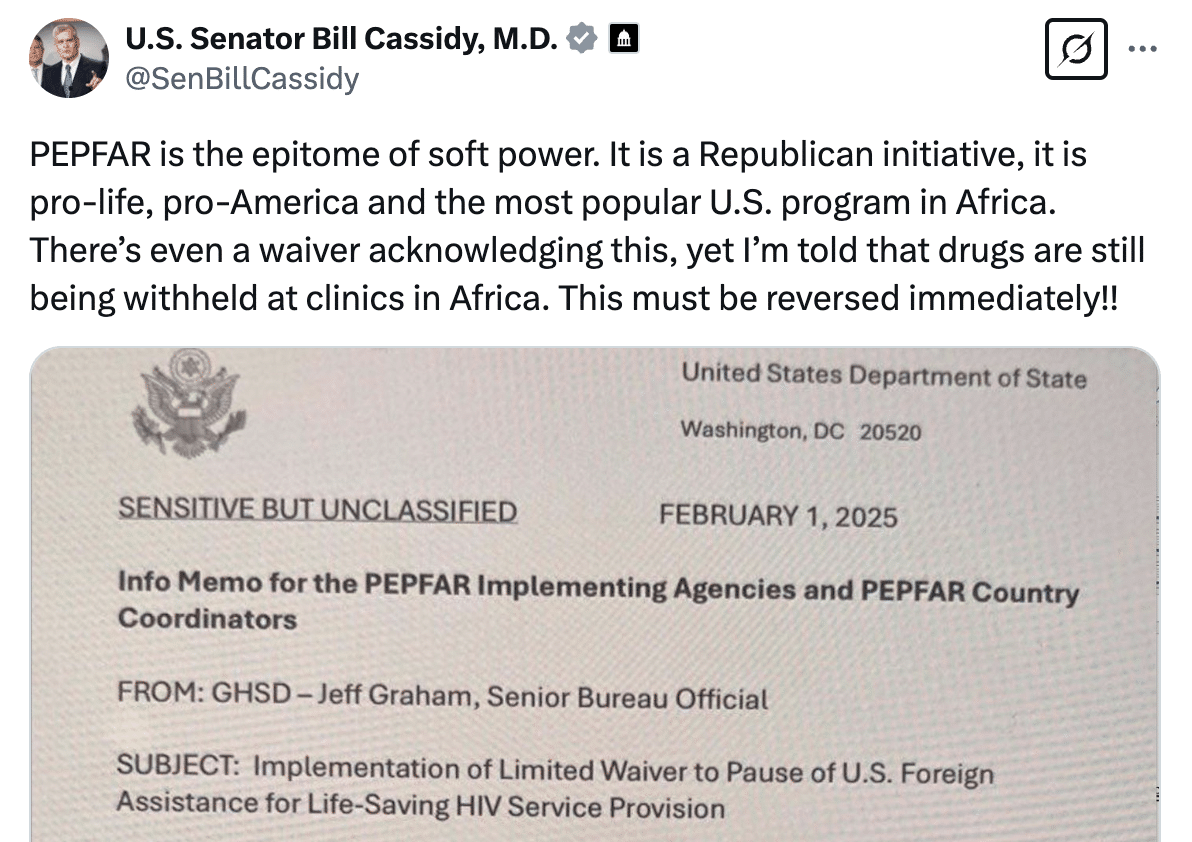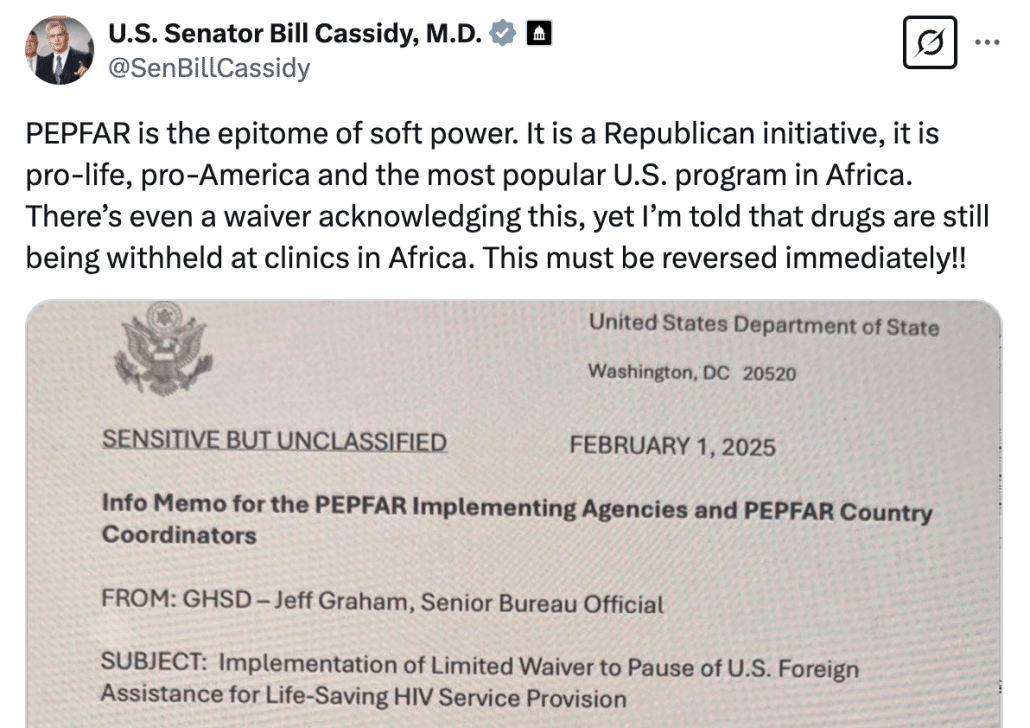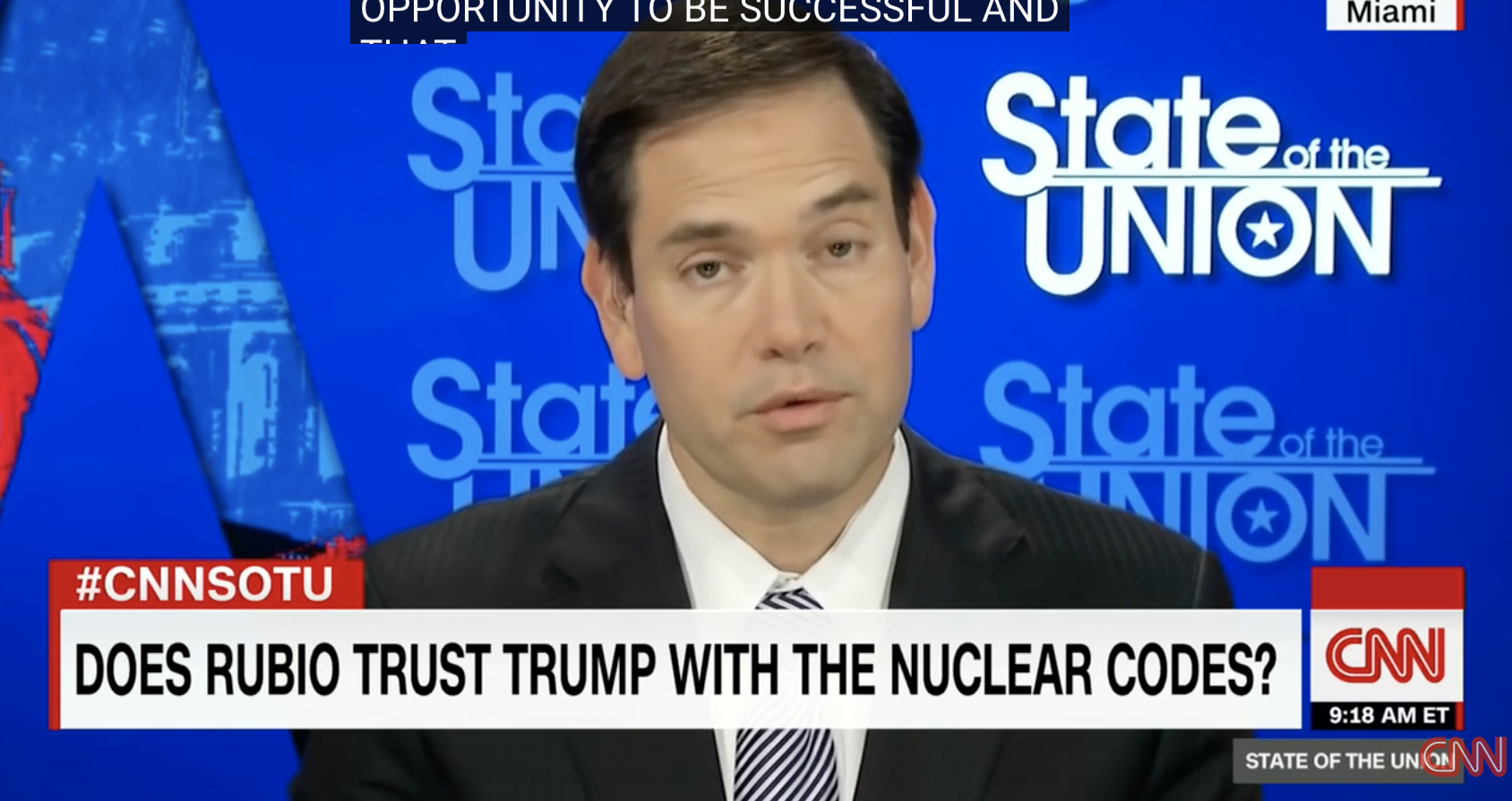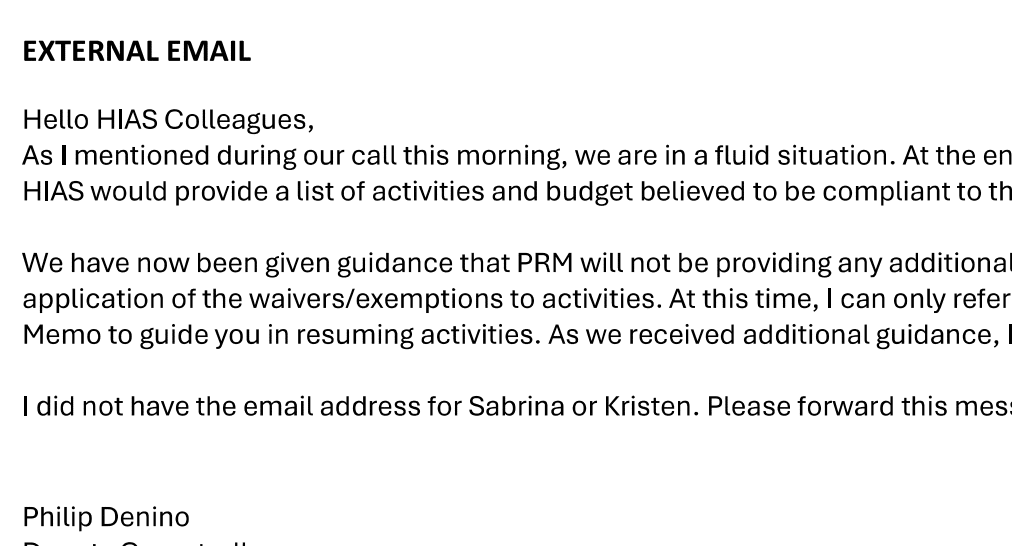Pete Marocco Keeps Trying to Prevent Bill Cassidy from Learning the Truth about USAID
There’s been an underlying tension throughout the five week DOGE effort to suffocate USAID (and with it, millions of people around the world).
After Trump halted foreign assistance, Republicans spoke up, often quietly; but John Cornyn did so publicly in a hearing, Jerry Moran did so as well (in part to support Kansas Ag markets), and Bill Cassidy did so on Xitter, demanding that lifesaving programs that Republicans have long supported be restarted.
Over and over again, Rubio and others insisted that they had reversed course and restarted life-saving programs.
But both in court filings and anonymous leaks, people who have previously implemented USAID’s work (virtually all have been put on leave or ousted) disputed that the programs had been restarted.
That led to this intemperate comment from Rubio, in which he claimed that if humanitarian programs had not been restarted, it was because their organizations themselves were incompetent.
“Right now, there is no USAID humanitarian assistance happening,” a current USAID official in the humanitarian division said. “There are waivers put in place by Secretary Rubio for emergency food assistance and a number of other sectors, but they are a fraud and a sham and intended to give the illusion of continuity, which is untrue.”
The official also slammed the waiver as unclear and largely unactionable because staff has been furloughed, as Elon Musk’s Department of Government Efficiency seized control of the agency.
“There is no staff left anymore to actually process waiver requests or to move money or to make awards or to do anything,” that official added. “We’ve ceased to exist.”
Secretary of State Marco Rubio on Tuesday pushed back on nongovernmental organizations saying aid programs remained paused despite the waiver.
“I issued a blanket waiver that said if this is lifesaving programs, OK — if it’s providing food or medicine or anything that is saving lives and is immediate and urgent, you’re not included in the freeze,” he said. “I don’t know how much more clear we can be than that.
“And I would say if some organization is receiving funds from the United States and does not know how to apply a waiver, then I have real questions about the competence of that organization, or I wonder whether they’re deliberately sabotaging it for purposes of making a political point,” Rubio added.
Since then, USAID has twice silenced people continuing to debunk Rubio’s claim to have restored humanitarian care.
On February 13, USAID released a memo purporting to correct a “false narrative,” “clarifying that Global Health (GH) programming under the lifesaving humanitarian waiver has continued uninterrupted and was never paused” — effectively an order to adhere to the lie that Marco Rubio’s order had actually restored care.
Then, on Friday, USAID retaliated against the truth once again.
After the Acting Assistant Administrator for Global Health, Nicholas Enrich, issued a memo describing that such aide has never been restored, he was placed on paid leave.
The memo itself presents a detailed timeline of the various ways that aide was stalled and identifies a large number of specific documents where he memorialized each step of the process (the NYT, in its story on Enrich’s suspension, describes obtaining “a series of memos,” and I assume about five other outlets did too; it detailed and released a different memo cataloging likely impacts).
It details specific ways DOGE interfered with the release of lifesaving funds by restricting access to the financial systems needed to process waivers.
From the start, the Programs Group alerted Agency leadership that the lack of access to funds for implementing partners was a critical impediment to the ability to implement the waiver, as access to USAID financial systems (GLAAS and Phoenix) had been completely turned off by DOGE, per Bob Kingman and Daniel Gaush from Department of State ICASS Service Center, preventing the flow of any funds to implementing partners who were approved to implement LHA activities.
It describes how Christian nationalist Pete Marocco personally intervened to ensure that the Ebola relief Elon Musk claimed had been restored could not be restored if doing so involved the World Health Organization.
On February 18th, A-AA Enrich shared an action memo with Mark Lloyd recommending the utilization of an existing agreement with the WHO to utilize previously obligated funds to access a critical stockpile of PPE and lab supplies to support the Uganda Ebola outbreak response. While the activities would normally be covered in the regular process for the lifesaving humanitarian assistance waiver, this memo was drafted for approval from State/F Director Pete Marocco, given that the implementing partner of the agreement is WHO, the subject of a separate Executive Order. Mark Lloyd cleared the memo on Feb. 19th and it was sent forward for COS Borkert clearance and DFA Pete Marocco signature. COS Borkert specified that DFA Marocco would not sign the memo and would not agree to utilizing the agreement with WHO to access the PPE stockpile, and instead ordered A-AA Enrich to “pick up the PPE and deliver it to the necessary people and organizations in the region to respond to ongoing infectious disease outbreaks” without utilizing the agreement with WHO. DFA Marocco immediately responded to Borkert’s email, threatening to the jobs of GH staff if an alternate plan was not carried out immediately, directing political appointees Borkert, Lloyd and Meisburger to “take all necessary personnel actions in the event this is not completed in the next 12 hours.”
It continues the explanation of what happened with Ebola: six days later, political appointees specifically deprioritized getting Ebola funding (and that for other “neglected tropical diseases”) restarted.
On February 24, in an effort to move forward approvals and payments, the GH leadership team (A-AA Enrich and DAA Coles) walked through each waiver request with political leadership (Mark Lloyd and Tim Meisburger) in an effort to move forward approvals and payments. Political leadership provided guidance instructing GH to narrow the focus of its requests and to deprioritize activities related to neglected tropical diseases, Mpox, polio, Ebola, and any monitoring and surveillance activities, as those would not be approved.
Then, when State shut down virtually all foreign aide last week, they shut down (inadvertently, they claimed later) Ebola programs along with everything else.
Additionally, on February 26th, over 5,000 USAID awards were terminated globally; GH was not notified of this action before it happened. The terminated awards included almost all of the awards that were needed to implement lifesaving activities. A-AA Enrich informed COS Borkert, SBO Jackson, and AtAs Lloyd and Meisburger immediately of the grave impacts on lifesaving activities related to malaria, tuberculosis, and ebola. In an email following the February 26th terminations, DCOS Borkert indicated that the awards that were terminated should not have been, and had been terminated in error: “Please hold on these life saving programs and let us review in the morning. There is an acknowledgement some may have been sent out in error and we have the ability to rescind. We need to identify what those are.” [my emphasis]
The memo even details the genesis of the earlier, February 13 memo:
On February 13th, A-AA Enrich and Senior Deputy Assistant Administrator (SDAA) Julie Wallace were told by DCOS Borkert that there had been a false narrative spread in the media that GH had been told to pause on approving activities under the LHA waiver. A-AA Enrich stated that the Agency FO had in fact told GH to pause on further approvals, and reminded him of the previous day’s email. DCOS Borkert as well as other senior advisors, including AtA Tim Meisburger and Senior FO Advisor Laken Rapier shouted at A-AA Enrich that there had never been a pause, and instructed him to immediately draft another Info Memo to correct the “false narrative in the media that there had ever been a pause.”
On February 13th, GH circulated the memo from AtA Mark Lloyd “performing the duties of Assistant Administrator, Global Health” which among other things, reiterated GH’s approach to approval of waivers per the earlier February 4th memo.
While agency leadership previously told GH to only include requests for 30 days (articulated in the February 4th memo), GH was subsequently asked to shift to the original 90 days as articulated in the original waiver language. This was updated in the February 13th memo. [my emphasis]
As a whole, it provides this summary of who is responsible for preventing lifesaving programs from being sustained: political leadership and DOGE.
USAID’s failure to implement lifesaving humanitarian assistance under the waiver is the result of political leadership at USAID, the Department of State, and DOGE, who have created and continue to create intentional and/or unintentional obstacles that have wholly prevented implementation. These actions include the refusal to pay for assistance activities conducted or goods and services rendered, the blockage and restriction of access to USAID’s payment systems followed by the creation of new and ineffective processes for payments, the ever-changing guidance as to what qualifies as “lifesaving” and whose approval is needed in making that decision, and most recently, the sweeping terminations of the most critical implementing mechanisms necessary for providing lifesaving services. These actions individually and in combination have resulted in the U.S. Government’s failure to implement critical lifesaving activities. This will no doubt result in preventable death, destabilization, and threats to national security on a massive scale. This memo serves to document the LHA waiver process and challenges encountered by the Bureau for Global Health to date, excluding PEPFAR.
In other words, Nicholas Enrich documented everything that had happened in spite of Rubio’s public order, and he was ousted.
While it’s not surprising, it’s not entirely clear whether there’s a specific reason he was ousted. That is, it’s not clear to me which facts people like Pete Marocco are trying to suppress:
- The specific actions taken by DOGE to thwart Rubio’s order.
- Marocco’s own specific complicity with decisions that will lead to the deaths of millions.
- The sheer amount of advance warning that political leadership got
- Rubio’s possible lack of involvement in things that Marocco has told courts he was personally involved in, which I wrote up here
But I can’t help but notice that Rubio responded to demands from Republican Senators that life-saving programs be restarted. And State has spent a good deal of time since then trying to hide the ways that people at USAID and State — people like Marocco and DOGE — directly undermined all efforts to do what Rubio assured Republican Senators was being done.
Are they trying to hide that people reporting to Rubio have directly undermined his order, the real insubordination that Marocco has blamed on USAID staffers? Or are they trying to hide that Rubio’s order was always a lie?
Whichever it is, Senators who were placated by Rubio’s past public claims are now on notice. They were lying to you. And while they were lying to you, food and medicine was spoiling and people were dying.





